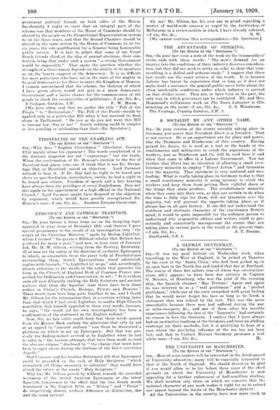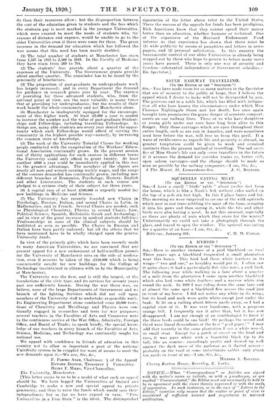THE UNIVERSITY OF MANCHESTER.
(To THE EDITOR OF THE " SPECTATOR.") SIR,—Most of your readers will be interested in the development of University education; many will be especially interested in that of the North of England. We should therefore be glad if you would allow us to lay before them some of the chief grounds on which the University of Manchester is now appealing for a further endowment of half-a-million sterling. We shall mention only those on which we conceive that the national character of our work makes it right for us to extend our appeal beyond the limits of the Manchester district.
All the Universities in the country have now more work to do than their resources allow; but the disproportion between the cost of the education given to students and the fees which the students pay is most marked in the younger Universities, which were created to meet the needs of students who, for reasons of distance and expense, would be unable to go to the older Universities even if there were room for them. The great increase in the demand for education which has followed the war means that this need has been nearly doubled.
(1) The total number of students at Manchester has risen from 1,537 in 1913 to 2,549 in 1919. In the Faculty of Medicine they have risen from 269 to 704.
(2) The students' fees provide about a quarter of the expenses of the University. The Government grants provide about another quarter. The remainder has to be found by the generosity of benefactors.
(3) The proportion of post-graduate to undergraduate work has largely increased; and in every Department the demand for guidance in research grows year by year. The expense of providing for these advanced students, who, from the national point of view, are the most valuable, is many times that of providing for undergraduates; but the results of their work benefit the whole community and not Manchester alone.
(4) Manchester is inadequately equipped for the encourage- ment of this higher work. At least £3,000 a year is needed to increase the number and the value of post-graduate Student- ships and Fellowships, including travelling Fellowships. As things are, many able students are every year denied the oppor- tunity which such Fellowships would afford of serving the community in the highest possible way—namely, by increasing the common store of knowledge.
(5) The work of the University Tutorial Classes for working people conducted with the co-operation of the Workers' Educa- tional Association continually grows. In the present session out of thirty applications for such courses in different towns the University could only afford to grant twenty. At least another £600 a year could be immediately applied in this way to the greatest advantage. The members of the classes are nearly all men and women earning weekly wages, and the range of the courses demanded has continually grown, including now different branches of Economics, Psychology, History, English and other Literatures. The students in each course are pledged to a serious study of their subject for three years.
(6) A capital sum of at least £100,000 is urgently needed for new buildings in Medicine and Science.
(7) The University has recently founded new Chairs in Psychology, Russian, Italian, and second Chairs in Latin, in Mathematics, and in French. Several Chairs are needed; such as Physiological Chemistry, Physics (a second Chair), Law, Political Science, Spanish, Hellenistic Greek and Archaeologn and in view of the great increase in medical students full-time Professorships in some of the clinical subjects should be instituted as soon as possible. The Chairs in Russian and Italian have been partly endowed; but all the others that we have mentioned have to be wholly charged upon the general University funds.
In view of the princely gifts which have been recently made to many American Universities, we are convinced that our present appeal for a new endowment of half-a-million pounds for the University of Manchester errs on the side of modera- tion, even if account be taken of the £150,000 which is being concurrently sought for new buildings for the College of Technology (maintained in alliance with us by the Municipality of Manchester).
The University was the first, and is still the largest, of the foundations of the civic type, and its services for seventy years past are sufficiently known. During the war there was, we believe, none of the large Departments of Government and no branch of the fighting Services which did not call upon members of the University staff to undertake responsible work. Its Engineering Department alone conducted some 20,000 tests; those of Chemistry and Metallurgy and Physics were con- tinually engaged in researches and tests for war purposes; several teachers in the Faculties of Arts and Commerce were in the continuous service of the War Office, Admiralty, Foreign Office, and Board of Trade; to speak briefly, the special know- ledge of our teachers in every branch of the Faculties of Arts. Science, Medicine, and Technology was continually sought for national use.
• We appeal with confidence to friends of education in this country not to allow so important a part of the national Univ&sity system to be crippled for want of means to meet the new demands upon it.—We are, Sir. &c., F. FORBES ADAM, ChairMan ) of the Appeal EDWARD DONNER, Treasurer 5 Committee. HENRY F. MIENS, Vice-Chancellor.
The University, Manchester.
[This letter seems to us to be a model of what such an appeal should be. We have begged the Universities of Oxford and Cambridge to make a new and special appeal to private generosity, and thus to raise the funds which would save thei^ independence; but so far we have argued in vain. "Free Universities in a Free State " is the ideal. The distinguished
signatories of the letter above refer to the United States. There the success of the appeals for funds has been prodigious. Rich Americans know that they cannot spend their money better than on education, whether humane or technical. One of the organizers of the Harvard Endowment Fund informs us that experience has shown that there must be (1) wide publicity by means of pamphlets and letters in news- papers, and (2) personal solicitation. In this country the bureaucratic control of our older Universities is already being mapped out by those who hope to govern us before many more years have passed. There ie only one way of security and freedom•—substantial independence of Government subsidies.— ED. Spectator.]



































 Previous page
Previous page